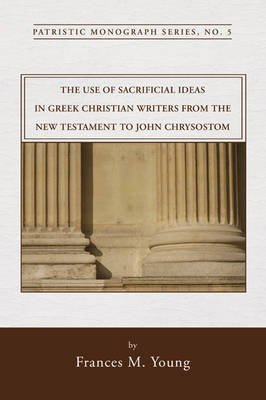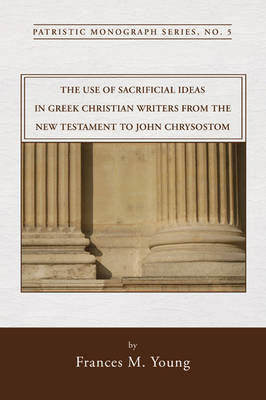
- Afhalen na 1 uur in een winkel met voorraad
- Gratis thuislevering in België vanaf € 30
- Ruim aanbod met 7 miljoen producten
- Afhalen na 1 uur in een winkel met voorraad
- Gratis thuislevering in België vanaf € 30
- Ruim aanbod met 7 miljoen producten
Zoeken
The Use of Sacrificial Ideas in Greek Christian Writers from the New Testament to John Chrysostom
Frances M Young
€ 54,95
+ 109 punten
Omschrijving
The subject of Christ's sacrifice on the Cross has mainly been treated in the context of general discussions of Atonement theory. This is inevitable, but when it occurs, his sacrifice tends to be confused with theories of substitution, satisfaction, and propitiation, in which case its nature is understood according to 'a priori' assumptions concerning the proper rationale of sacrifice. The result of this situation is that, according to their own convictions, historians of the Doctrine of the Atonement have either tended to accept sacrificial language in the Greek Fathers as evidence of the presence of the later Western theory of atonement, at any rate, in germ; or they have dismissed it as no more than the use of traditional Christian expressions which do not represent the real Doctrine held by the authors with whom we are concerned. In addition to this, the treatment of sacrificial language as one of the modes of expressing Atonement has meant that, in modern studies, the subject of Christ's sacrifice has been divorced from consideration of the sacrificial worship and service of the Church.... The aim of this study is to try to correct the balance, to emphasize the importance and diversity of sacrificial concepts in the theology and life of the early Eastern Church, and so to throw light on the usually confused treatment, not only of Christ's atoning death, but also of the sacrifice of the Eucharist. from the Introduction
Specificaties
Betrokkenen
- Auteur(s):
- Uitgeverij:
Inhoud
- Aantal bladzijden:
- 324
- Taal:
- Engels
- Reeks:
- Reeksnummer:
- nr. 5
Eigenschappen
- Productcode (EAN):
- 9781592449286
- Verschijningsdatum:
- 6/10/2004
- Uitvoering:
- Paperback
- Formaat:
- Trade paperback (VS)
- Afmetingen:
- 157 mm x 229 mm
- Gewicht:
- 449 g

Alleen bij Standaard Boekhandel
+ 109 punten op je klantenkaart van Standaard Boekhandel
Beoordelingen
We publiceren alleen reviews die voldoen aan de voorwaarden voor reviews. Bekijk onze voorwaarden voor reviews.











